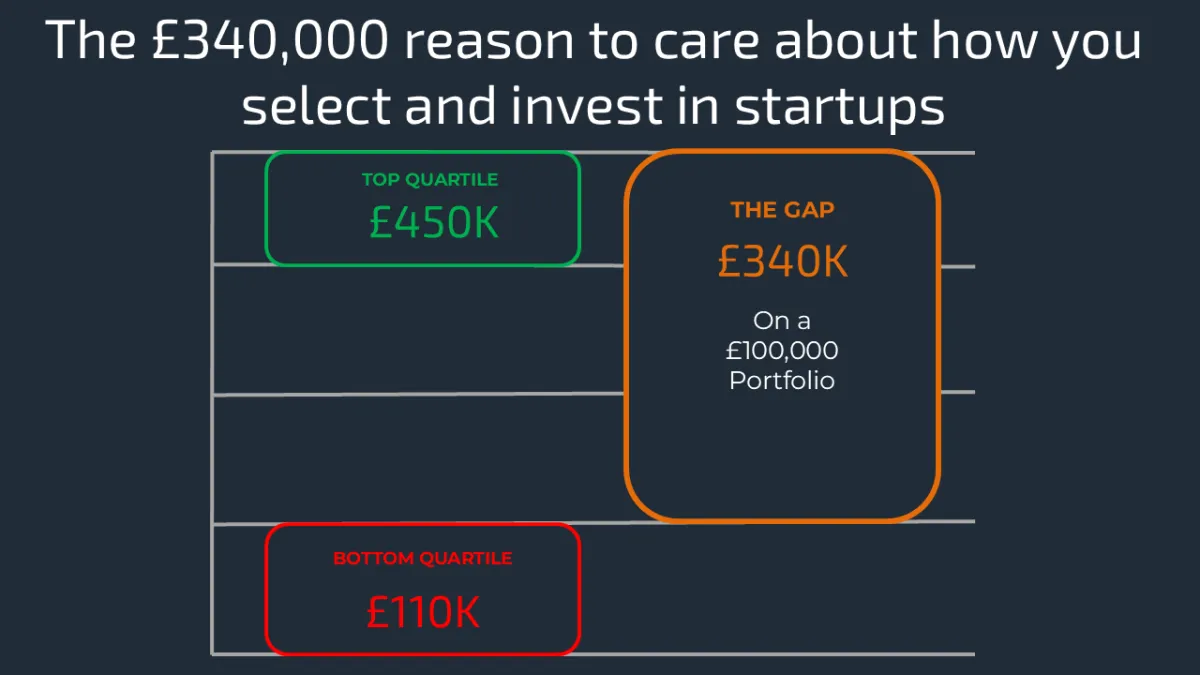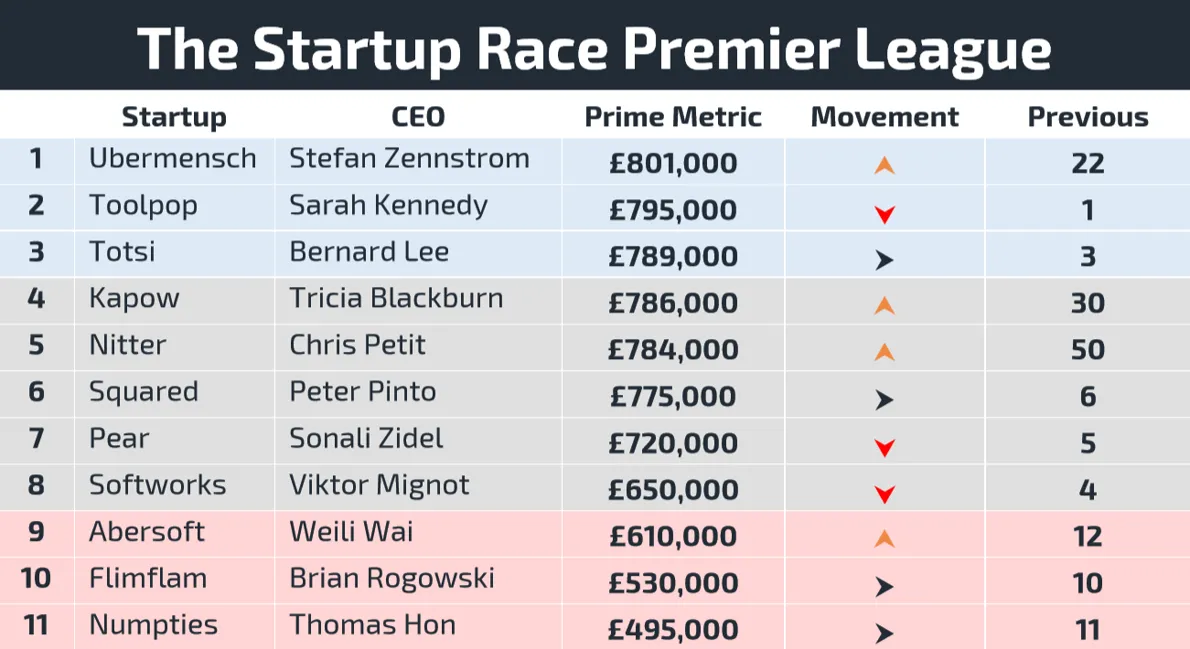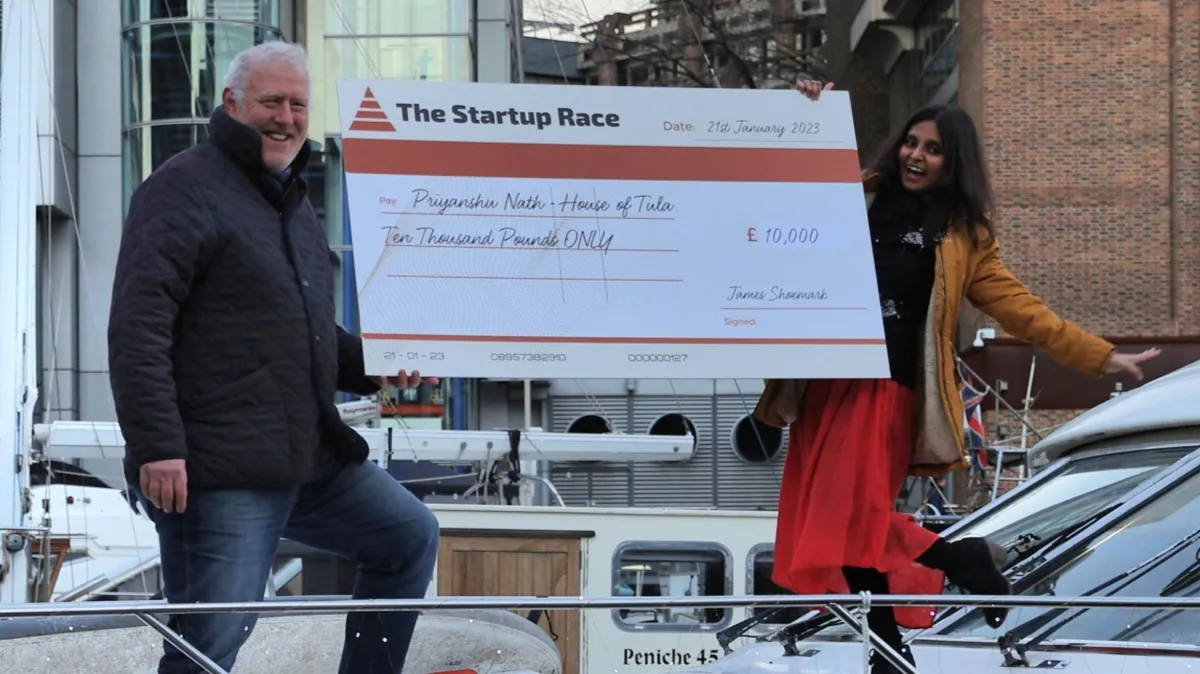The £100,000 Startup Race Syndicate
Commitments close: 31 March 2026
Proposed Start: 2 April 2026
Investment: 2 April 2027
Why This Matters: The £340,000 Reason to Care About Selection
Research across 3,097 angel investments shows something that should change how every angel thinks about their first check:
Due Diligence Time
Less than 20 hours
20–40 hours
40+ hours
Return Multiple
1.1X
5.9X
7.1X
Failure Rate
60–65%
~50%
~45%
Top-quartile angels turn £100,000 into approximately £450,000. Bottom-quartile angels barely break even at £110,000. Same asset class. Same time period. Same market conditions.
The difference is information quality at point of investment

Traditional due diligence creates a point-in-time snapshot built from founder claims and curated references. The Startup Race creates 52 weeks of verified, competitive, longitudinal performance data - more real observation than any due diligence process can produce.
Want more detail or information on the research? Read our Investor Memo here
The £100,000 Startup Race Format in Plain Terms
Who competes: 50 founders, each with £5,000+ Annual Recurring Revenue before they enter. They already have paying customers.
How they're ranked: Verified revenue pulled directly from business bank accounts via accounting software. No self-reporting. No manipulation.
The structure: A Premier League of the top 10, updated weekly on a public leaderboard. Drop out of the top 10? Fight your way back in.
The winner: The founder who generates the most cumulative revenue over 52 weeks wins £100,000 investment from the syndicate.
What you watch: Not a pitch. Not a presentation. You watch how 50 founders respond to competitive pressure, bad months, ranking drops, and a full year of accountability.
What Watching Actually Feels Like
Picture this: It's Monday morning. The league table updates.
That founder you've been watching? Three weeks ago they were 3rd. Then 7th. Then 9th - three brutal weeks of declining sales while you watched them scramble to figure out what broke.
This week? Back to 6th. Next week, 4th. The week after, 2nd.
Not through luck. Not through pivoting their story. Through relentless customer acquisition - twenty new customers in three weeks while their competitors made excuses about market conditions.
You didn't read about their resilience in a reference check. You watched it happen, week by week, for six months.
By April 2027, you're not evaluating a pitch deck. You're backing a founder whose character you've already observed under sustained competitive stress.
This is a fundamentally different investment experience.

The Track Record
This methodology has been tested. Three times.
Competition
£10,000 Race (2022)
Runner-up (2022)
£1,000 Race (2020)
Winner
Priyanshu Nath
Mariely Macias Olmedo
Jonas Virsilas
Revenue Growth
44X
17X
12X
Status
Still trading
Still trading
Still trading
To be clear: these are revenue growth figures during competition, not investment returns. What they show is that the methodology works - public competition, verified metrics, and sustained observation produce exceptional execution from founders who thrive under pressure.

Two Ways to Participate
Investment Prize Provider - £5,000 to £10,000
The primary route into the founding syndicate.
Your contribution combines with 10–20 other experienced angels to create the £100,000 investment prize. You watch the full 52-week race. You invest when it concludes.
What you get:
Pro-rata SEIS-eligible equity in the winning startup
Your name on the cap table - not behind a nominee
Full Premier League dashboard access throughout the race
Monthly investor updates with analysis and observations
First opportunity to invest additional capital in top performers
Priority access to the £1,000,000 Startup Race (founding syndicate only)
What you commit to: A Commitment Letter confirming your intended contribution. Not a legally binding contract - but a genuine commitment the winning founder will rely on. No money moves until April 2027.
Race Observer - No investment commitment
Watch the full race. Invest in any participant that interests you directly.
Full league table access for all 50 startups. 52 weeks of verified performance data. Freedom to approach any founder for direct investment discussions at any point during or after the race.
The Investment Structure
Element
Individual contribution
Tax wrapper
Syndicate lead co-investment
Syndicate lead carry
Timeline
Detail
£5,000–£10,000
SEIS (Advance Assurance obtained after week 30)
£10,000
10% of profits
52-week competition → investment on or around April 2027
We co-invest £10,000 alongside you. The 10% carry on profits is standard for led syndicates and ensures alignment - we only succeed when you succeed.
SEIS: The asymmetry that makes early-stage investing rational
For a 45% taxpayer investing £10,000:
50% income tax relief: £5,000 returned immediately
If the company fails completely: 45% loss relief on remaining £5,000 = £2,250 returned
Maximum actual loss: £2,750 — 27.5% of original investment
If the company succeeds: uncapped gains, zero CGT
Tax treatment depends on individual circumstances and may change. The winning startup will hold SEIS Advance Assurance. Seek professional advice.
Why Direct Investment Matters
Each investor in the Startup Race syndicate invests independently in the winning company. You subscribe for your own shares. You appear on the cap table. You receive your own SEIS3 certificate.
This is the same structure used by Cambridge Angels and Archangels — individual shareholding with no pooling of assets. Each member makes a completely independent investment decision.
This means FCA compliance without authorisation (we rely on Articles 48 and 50A of the Financial Promotion Order, the same self-certification exemptions established syndicates use), clean SEIS treatment with no fund structure complications, and a direct relationship with the company.
What the Startup Race coordinates: Ensuring the winner has SEIS Advance Assurance before investment; timing so all syndicate members invest together; liaising with the winning company on Form SEIS1; chasing your SEIS3 certificate; facilitating introductions if you want to invest further in top performers.
The investment itself is yours. Direct. Independent. Clean.
The Process: Seven Steps
Step 1: Express Your Interest
Complete the short form. This is the low-friction first step - it doesn't commit you to anything and doesn't trigger any money movement.
Step 2: Self-Certification
Complete either a High-Net-Worth Individual or Sophisticated Investor statement. FCA regulations require this before we can send you investment communications. If you've invested through syndicates before, you've done this many times.
Step 3: Submit AML/KYC Documents
Confirm your identity to comply with Anti-Money Laundering and Know Your Customer regulations. Standard practice for angel syndicates. Upload ID and proof of address via our website or email copies directly.
Step 4: A 20-Minute Call With James
Partly to meet you - the syndicate is small and we'd like to know who's in it. Partly to answer any questions. Partly to complete identity verification (passport, proof of address, PEP confirmation — standard AML practice for angel syndicates).
Step 5: Sign Your Commitment Letter
A Commitment Letter capturing your intended contribution (£5,000–£10,000). Not a legally binding contract, but a genuine commitment we rely on. You can read the template here.
Step 6: Watch the £100,000 Startup Race (April 2026 – March 2027)
Weekly league table access. Monthly investor updates. Watch 50 founders compete under observation. Check in as much or as little as you like. No money moves during this period.
Step 7: Final Verification + Invest (March/April 2027)
Source of Funds declaration and PEP status refresh before funds move — standard compliance. Then: Subscription Agreement with the winning company. Fund transfer directly to the startup. Share certificate issued. SEIS3 coordinated.
That's it. Seven steps. One investment in a founder who proved themselves over 52 weeks.
Timeline: Key Dates
Milestone
Prize Provider recruitment
Commitment Letters confirmed
Race begins
Weekly league tables published
Race concludes
Investment into winner
Date
Now – Q1 2026
By March 2026
April 2026
Throughout 2026–2027
March 2027
On or around April 2027
The £100,000 Startup Race Is For Investors Who:
Have grown frustrated with pitch-based selection and want a better signal
Believe behaviour under pressure predicts performance better than presentations
Want to observe founders compete (publicly, verifiably) before committing capital
Value 12 months of revenue data over 12 slides of projections
Understand early-stage investment risk and appreciate how SEIS mitigates it
This Is Not For Investors Who:
Prefer to be hands-on during the selection process
Want to invest in companies at later stages with proven market position
Are looking for immediate liquidity
Prefer traditional pitch-based evaluation with direct access to founders before investment
Need investments that can be exited quickly
Early-stage investing carries significant risk, including loss of capital. SEIS tax relief mitigates but doesn't eliminate this risk.
Join the Founding Syndicate
Once you have provided your contact details, you'll gain access to the self-certification form immediately.
Questions before committing?
Option 1 - Read our investor memo
Option 2 - Schedule a call with James
FCA Requirements
To participate, you must self-certify as a High-Net-Worth Individual or Sophisticated Investor.
High-Net-Worth Individual: Annual income of £100,000+ OR net assets of £250,000+ (excluding primary residence and pension).
Self-Certified Sophisticated Investor: Member of an angel network for 6+ months, made 2+ investments in unlisted companies in the past 2 years, worked professionally in private equity or SME finance, or served as director of a company with £1.6m+ turnover.
This page is for information only and does not constitute investment advice. The Startup Race Ltd is not arranging an investment deal. Investment in early-stage companies involves significant risks including illiquidity, lack of dividends, and potential total loss of capital. Tax reliefs depend on individual circumstances and may change. Please seek independent professional advice before investing.
© Copyright The Startup Race 2026